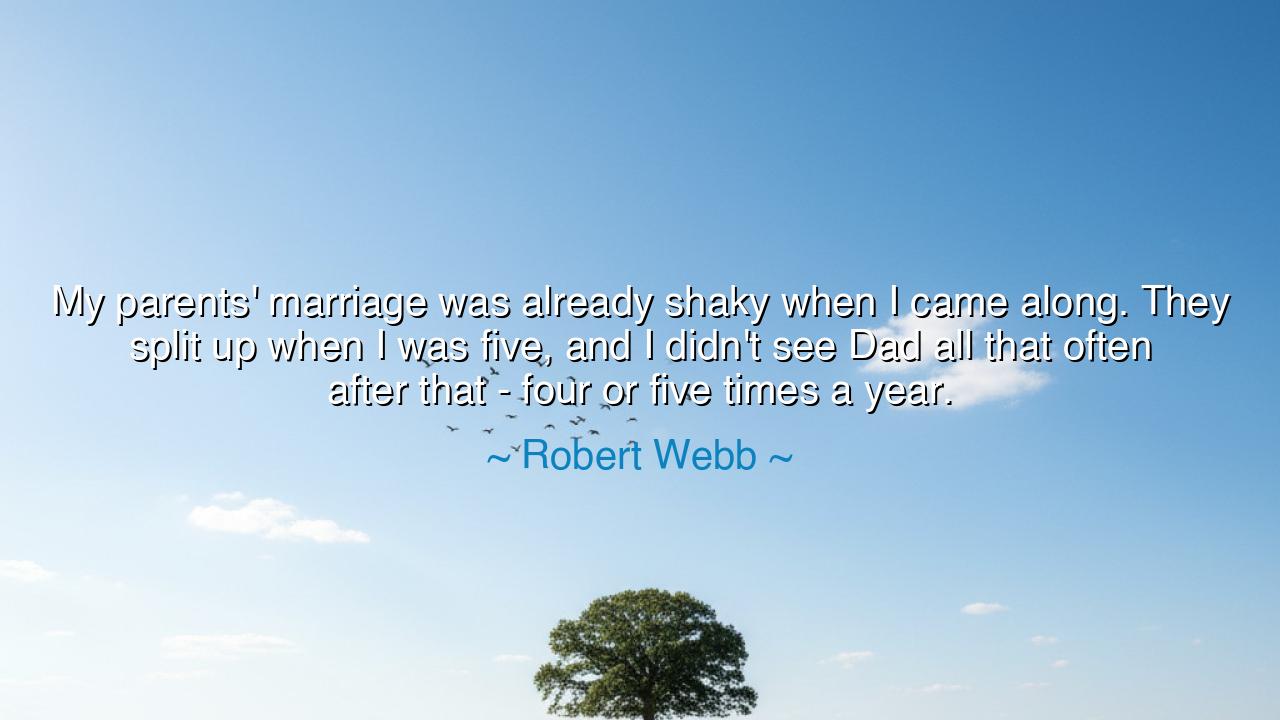
My parents' marriage was already shaky when I came along. They
My parents' marriage was already shaky when I came along. They split up when I was five, and I didn't see Dad all that often after that - four or five times a year.






In the words of Robert Webb, “My parents’ marriage was already shaky when I came along. They split up when I was five, and I didn’t see Dad all that often after that — four or five times a year.” These words, though spoken plainly, echo with the deep ache of childhood — the ache of separation, of absence, and of the longing that shapes a life. They speak not only for one man, but for all who have grown from broken homes and learned to build strength from fragments. In this quiet confession lies the ancient story of how pain, when understood, becomes wisdom, and how love, though divided, still leaves its mark upon the soul.
Robert Webb, known to the world as a writer, comedian, and actor, speaks here not from the stage, but from the heart. His memory of his parents’ separation is not one of anger, but of recognition — a recognition that the roots of our lives are not always planted in steady soil. Yet from such soil can still grow compassion, creativity, and resilience. For the child who learns to navigate two worlds, who learns to love both presence and absence, often grows into an adult who understands both joy and sorrow more deeply than most.
The ancients, too, understood this truth — that loss is the first teacher of empathy. In the story of Telemachus, the son of Odysseus, we find a young boy who grows up without the father he longs for. Odysseus is far away, fighting wars and wandering seas, and Telemachus must learn to find strength in his own heart. When at last they are reunited, the son has become wise — tempered by patience, shaped by waiting. So too, in Webb’s reflection, we see this timeless pattern: the child separated from the parent learns endurance, and endurance, when transformed by understanding, becomes a form of grace.
When Webb says he saw his father only “four or five times a year,” there is sorrow in those words, but also quiet acceptance. Many carry such memories — of distant fathers, of missed birthdays, of letters never sent. Yet such distance can also awaken a longing that deepens the soul’s capacity for connection. Those who have known the pain of absence often grow to cherish the presence of others with greater tenderness. Out of what was broken, they learn to mend. Out of what was lacking, they learn to give. This is the alchemy of the wounded heart — to turn loss into love.
But let us not romanticize the wound; it is real. Children of divided homes carry scars, even as they grow strong. The wise do not deny this pain; they look upon it honestly. In doing so, they free themselves from the chains of resentment. Robert Webb, through reflection and art, has turned his childhood story into a source of empathy, using humor and honesty to speak to others who share his path. In this, he mirrors the work of countless souls who have made beauty from their brokenness.
The lesson that flows from these words is both gentle and powerful: though we cannot choose the circumstances of our birth, we can choose what they make of us. To those who have known separation, neglect, or distance — remember that love, though wounded, still lives within you. You may have been shaped by sorrow, but you are not bound by it. Forgive where you can, understand where you must, and use your story not as a burden, but as a bridge to others who need to know they are not alone.
So, children of the present and heirs of the past, take this truth to heart: family is not always whole, but love can be. The father who could not stay still leaves lessons through his absence; the mother who remained teaches resilience through her strength. And you, who have endured both, carry in your heart the wisdom of both presence and loss. Let it guide you toward compassion, not bitterness; toward understanding, not despair.
Thus spoke Robert Webb, and through his story comes a timeless truth — that from the cracks of our early lives, light may still enter. The child who once waited for his father’s visit becomes the man who understands the value of love in all its fragile forms. Remember, then, to hold close those who stay, forgive those who leave, and let your heart, though once divided, become whole through kindness.






AAdministratorAdministrator
Welcome, honored guests. Please leave a comment, we will respond soon